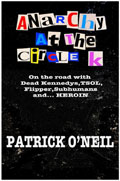Recovery Memoir Illuminates the Power of Vulnerability Through Writing
by Ryan M. Moser, Prison Journalism Project
November 2, 2021
When I was asked to review “Writing Your Way to Recovery: How Stories Can Change Our Lives,” by James Brown and Patrick O’Neil, I initially balked. Although I’m an incarcerated writer and a recovering addict, I didn’t feel qualified to comment on an addiction memoir.
But after reading this new book of extraordinary personal stories and creative writing exercises, I felt like I had to share their important message and try to articulate what these two writers are doing for the substance abuse treatment community at large.
Brown and O’Neil have made it easy to relate to what they experienced before sobriety; I felt like I was there with them all along. In the opening, Brown spoke for the authors saying, “we wanted to escape our feelings,” and I knew that he was talking about me and millions of other alcoholics and addicts.
The sheer vulnerability these writers demonstrate is antithetical to the lies addicts tell our loved ones, co-workers and friends. When O’Neil revealed his dyslexia and how he was lost as an inmate at San Quentin State Prison, or how he hid a heroin addiction from his poor mother, I could imagine the weight sliding from his shoulders. He tells us later that, “honesty is one of the cornerstones of recovery.”
More important than telling the stories, the authors discuss the catharsis of writing about one’s fears and trauma with the desperation of addiction, creating a new path for reconciliation. Broad writing is functional, but writing about one’s feelings heals. It taps the inner dialogue of the brain reserved for unfiltered introspection, more than therapy or daydreaming.
From the first journaling exercise to the last provided in this book, the writers encourage the alcoholic-addict to get to know themselves, a difficult task for people who have historically avoided revealing our true nature. Brown’s exercise on writing from the point-of-view of someone who loves an alcoholic-addict opens your eyes up to the “selfish disease” we carry with us, “bound to have hurt anyone who ever cared about us.”
O’Neil continues: “If you want to work through your unresolved resentments, that overwhelming sense of guilt, or those persistent fears — especially the ones that you’ve been denying and avoiding — then writing about them is an excellent tool to begin the process.” Do the heart-work, as the Austrian poet Rainer Maria Rilke tells us.
By working the 12 steps, gaining sponsorship, and attending meetings, these two writers have found a sweet spot in recovery that will last, but every addiction carries with it the chance of relapse, and they describe the “Big R” by using their own stories.
When Brown admits to relapsing over and over again, yet you look at his success in life after drugs and alcohol, it gives hope to the many people who try and fail, who feel like they can’t break the cycle of addiction and resolve to be less-than forever.
Describing one relapse after two-and-a-half years of staying clean, O’Neil wrote about how one trivial decision, like dining at a restaurant with notoriously good martinis, can wreck your life all over again.
These two authors — ex-offenders and recovering alcoholic-addicts — are now changed men who inspire others with their frank evaluation of the inside life — and they started by writing it down.
O’Neil touched on a personal dilemma I had when I first came to prison and finally got clean and sober: “Without alcohol and drugs all my pain, fear and self-doubt were now front and center.” Journaling those feelings was therapeutic for me in my darkest hour, and helped me navigate the difficult beginning of sobriety.
Released in March 2021, this book is a tell-all revelation about the depths of our disease, and the writing exercises will be a tool for many to face their problems at last, possibly ending the long, suffering road of addiction.

Ryan M. Moser is a contributing writer, serving a ten-year sentence in the Florida Department of Corrections for a nonviolent property crime. His work has been published in the Evening Street Review, Storyteller, Santa Fe Literary Review, The Progressive, The Marshall Project, Medium, The Wild Word, The Startup, and more. In 2020, his essay, “Injuries Incompatible with Life” received an Honorable Mention award from PEN America. Ryan, is a Philadelphia native who enjoys yoga, playing chess, and performing live music. He is the proud father of two beautiful sons. He is a recovering drug addict.
Originally Published in Prison Journalism Project November 2nd, 2021

